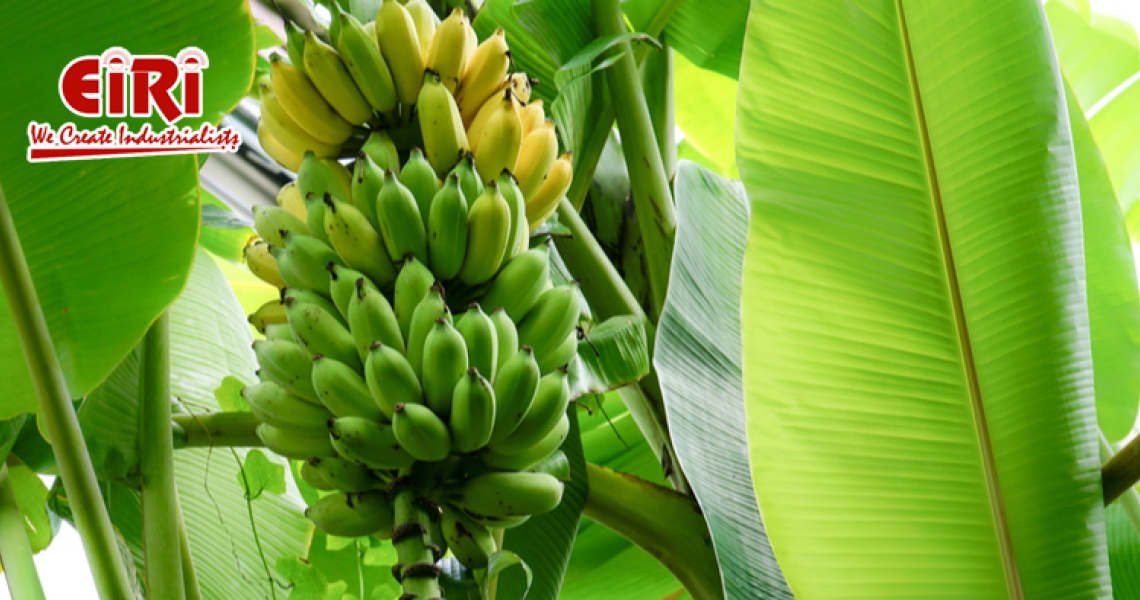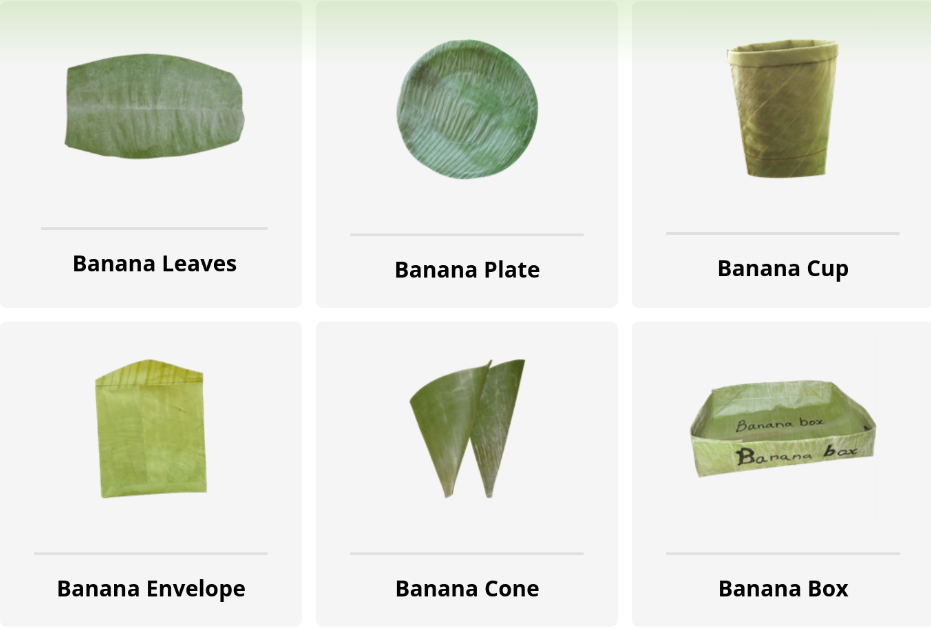Profitable and Sustainable Business Ideas with Banana Leaves

Banana leaves have been an integral part of various cultures for centuries, serving as more than just a plate or packaging material. With their unique properties and versatility, banana leaves offer numerous business opportunities that are not only profitable but also sustainable. In this article, we will explore the applications and uses of banana leaves, discuss the future scope and market forecast, and highlight the challenges and opportunities associated with starting a business in this growing industry.
Applications and Use of Banana Leaves:
Banana leaves have a wide range of applications in different industries. In the culinary world, they are used as natural food wraps, imparting a distinct aroma and flavor to dishes. From traditional meals to street food and gourmet cuisine, banana leaves provide an eco-friendly alternative to single-use plastic or Styrofoam packaging. Additionally, banana leaves are utilized in the beauty and wellness industry for their therapeutic properties, serving as natural ingredients in skincare products, herbal remedies, and spa treatments.
Eco-friendly Disposable
Plates and Utensils: Banana leaves are an excellent alternative to plastic or paper plates. They are biodegradable, natural, and have a charming rustic appeal. Setting up a business that produces and sells eco-friendly disposable plates and utensils made from banana leaves can be a profitable venture, especially in areas with a high demand for sustainable alternatives.
Packaging and Wrapping Materials:
Banana leaves have been used for centuries as natural packaging and wrapping materials. They provide a breathable and moisture-resistant covering for various products, including food items. Starting a business that specializes in manufacturing and supplying banana leaf-based packaging materials can cater to the growing demand for sustainable packaging solutions.
Handicrafts and Home Decor:
Banana leaves can be creatively transformed into unique handicrafts and home decor items. From wall hangings and lampshades to woven baskets and table mats, there is a wide range of possibilities. Establishing a business that produces and sells banana leaf handicrafts can cater to the growing market for eco-friendly and artisanal products.
Natural Food Wraps:
Banana leaves are often used as natural food wraps, especially in traditional cuisines. These wraps not only impart a distinct flavor but also help retain moisture and aroma in the food. Launching a business that specializes in manufacturing and supplying banana leaf food wraps can cater to the demand for natural and sustainable alternatives to plastic wraps or aluminum foil.
Herbal Cosmetics and Skincare Products:
Banana leaves have natural properties that make them suitable for skincare and cosmetic applications. Extracts from banana leaves can be used in the formulation of herbal soaps, lotions, creams, and other skincare products. Starting a business that focuses on producing and marketing natural and organic cosmetics and skincare products enriched with banana leaf extracts can tap into the growing market for sustainable and chemical-free beauty products.
Agricultural Applications:
Banana leaves have various agricultural applications. They can be used as natural mulch to protect soil moisture, as compost or organic fertilizer, or as fodder for livestock. Establishing a business that collects and processes banana leaves for these agricultural purposes can be a viable venture, especially in regions with a significant banana cultivation industry.

Future Scope and Market Forecast:
The market for banana leaves and related products is witnessing significant growth due to the increasing demand for sustainable alternatives and the growing awareness of environmental conservation. As consumers shift towards eco-friendly options, businesses utilizing banana leaves have a promising future. The market forecast indicates a steady rise in demand for banana leaf-based products, both locally and globally. With expanding market opportunities and the potential for innovation, entrepreneurs can tap into this sustainable industry for long-term success.
The Banana Market size is expected to grow from USD 139.72 billion in 2023 to USD 145.40 billion by 2028, at a CAGR of 0.80% during the forecast period (2023-2028).
The banana market is projected to witness substantial growth, with its size expected to increase from USD 139.72 billion in 2023 to USD 145.40 billion by 2028. This represents a compound annual growth rate (CAGR) of 0.80% during the forecast period of 2023 to 2028. The steady expansion of the banana industry highlights the promising opportunities for businesses associated with banana leaves, which play a vital role in various applications and offer immense potential for profitability and sustainability.
Challenges and Opportunities - Banana Leaves Processing Industry:
While the banana leaf business presents lucrative prospects, it is essential to consider the challenges and opportunities associated with it. One of the primary challenges is ensuring a consistent supply of high-quality banana leaves, as they are perishable and require careful handling and storage. Establishing strong supply chain networks and cultivating relationships with local farmers can help overcome this challenge. Additionally, understanding and complying with relevant regulations and certifications, such as organic and fair trade standards, can provide a competitive advantage and open doors to international markets.
The banana leaves processing industry presents several challenges and opportunities for entrepreneurs and businesses. Understanding these factors is crucial for successfully navigating the market and maximizing growth potential. Let's explore some of the key challenges and opportunities in the banana leaves processing industry:
Challenges:
Seasonal Availability: Banana leaves are primarily harvested from banana plants, which have specific growth seasons. This limited availability can pose challenges in maintaining a consistent supply throughout the year, especially for businesses catering to a large-scale market.
Quality Control: Ensuring the quality of banana leaves is essential to meet the requirements of various applications. Factors such as size, texture, color, and freshness play a significant role in determining the value of the leaves. Maintaining consistent quality standards can be challenging due to natural variations and the potential for damage during harvesting, transport, and processing.
Storage and Preservation: Banana leaves are perishable and require proper storage and preservation techniques to maintain their freshness and usability. Developing effective methods for extending the shelf life of banana leaves without compromising their quality is essential for businesses operating in this industry.
Market Competition: The banana leaves processing industry may face competition from alternative packaging and food presentation materials. Businesses need to differentiate themselves by offering unique value propositions, such as eco-friendliness, affordability, or superior quality, to stay ahead in the market.
Opportunities:
Diverse Applications: Banana leaves have a wide range of applications in various industries, including food packaging, cooking, crafts, and religious ceremonies. Exploring and capitalizing on these diverse applications can open up new markets and revenue streams.
Eco-Friendly Packaging: With increasing awareness about sustainable and eco-friendly alternatives, banana leaves offer an excellent opportunity as a biodegradable and renewable packaging material. Businesses can position themselves as environmentally conscious and attract customers seeking eco-friendly alternatives to plastic and synthetic packaging materials.
Cultural Significance: Banana leaves hold significant cultural and traditional importance in many regions. Leveraging this cultural significance can create niche markets for businesses catering to specific communities or events where the use of banana leaves is deeply rooted in tradition.
Value-Added Products: Besides selling banana leaves as standalone products, businesses can explore value-added products such as pre-cut leaves, processed banana leaf extracts, or eco-friendly disposable tableware made from banana leaves. These products can cater to specific customer needs and preferences, creating additional revenue opportunities.
The banana leaves processing industry presents both challenges and opportunities. By addressing the challenges effectively and capitalizing on the growing demand for sustainable and eco-friendly alternatives, businesses can thrive in this industry. Strategic planning, innovation, and a deep understanding of market dynamics will be crucial for success.
Conclusion:
The business potential of banana leaves extends beyond their traditional use, offering profitable and sustainable opportunities in various industries. Entrepreneurs who venture into the banana leaf business can cater to the rising demand for eco-friendly alternatives, capitalize on the unique properties of banana leaves, and contribute to a greener and more sustainable future. By embracing innovation, maintaining quality standards, and staying attuned to market trends, businesses can thrive in this dynamic and rewarding industry.
Overall, the profitability and sustainability of business ideas with banana leaves make them an attractive choice for aspiring entrepreneurs looking to make a positive impact while building a successful venture.










